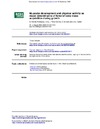Identificador persistente para citar o vincular este elemento:
https://accedacris.ulpgc.es/handle/10553/6508
| Title: | Muscular development and physical activity as major determinants of femoral bone mass acquisition during growth | Authors: | Vicente-Rodríguez, Germán Ara, Ignacio Pérez-Gómez, Jorge Dorado, C. Calbet, J. A.L. |
UNESCO Clasification: | 241106 Fisiología del ejercicio | Keywords: | Body composition Physiology Adolescent |
Issue Date: | 2005 | Journal: | British Journal of Sports Medicine | Abstract: | OBJECTIVES: To investigate to what extent bone mass accrual is determined by physical activity and changes in lean, fat, and total body mass during growth. METHODS: Twenty six physically active and 16 age matched control boys were followed up for three years. All subjects were prepubertal at the start of the survey (mean (SEM) age 9.4 (0.3) years). The weekly physical activity of the active boys included compulsory physical education sessions (80-90 minutes a week), three hours a week of extracurricular sports participation, and occasional sports competitions at weekends. The physical activity of the control group was limited to the compulsory physical education curriculum. Bone mineral content (BMC) and areal density (BMD), lean mass, and fat mass were measured by dual energy x ray absorptiometry. RESULTS: The effect of sports participation on femoral bone mass accrual was remarkable. Femoral BMC and BMD increased twice as much in the active group as in the controls over the three year period (p < 0.05). The greatest correlation was found between the increment in femoral bone mass and the increment in lean mass (BMC r = 0.67 and BMD r = 0.69, both p < 0.001). Multiple regression analysis revealed enhancement in lean mass as the best predictor of the increment in femoral bone BMC (R = 0.65) and BMD (R = 0.69). CONCLUSIONS: Long term sports participation during early adolescence results in greater accrual of bone mass. Enhancement of lean mass seems to be the best predictor of this bone mass accumulation. However, for a given muscle mass, a greater level of physical activity is associated with greater bone mass and density in peripubertal boys. | URI: | https://accedacris.ulpgc.es/handle/10553/6508 | ISSN: | 0306-3674 | DOI: | 10.1136/bjsm.2004.014431 | Source: | British Journal of Sports Medicine[ISSN 0306-3674],v. 39, p. 611-616 |
| Appears in Collections: | Artículos |
Show full item record
SCOPUSTM
Citations
105
checked on Jun 8, 2025
WEB OF SCIENCETM
Citations
102
checked on Jun 8, 2025
Page view(s)
106
checked on Nov 2, 2024
Download(s)
161
checked on Nov 2, 2024
Google ScholarTM
Check
Altmetric
Share
Export metadata
This item is licensed under a Creative Commons License

